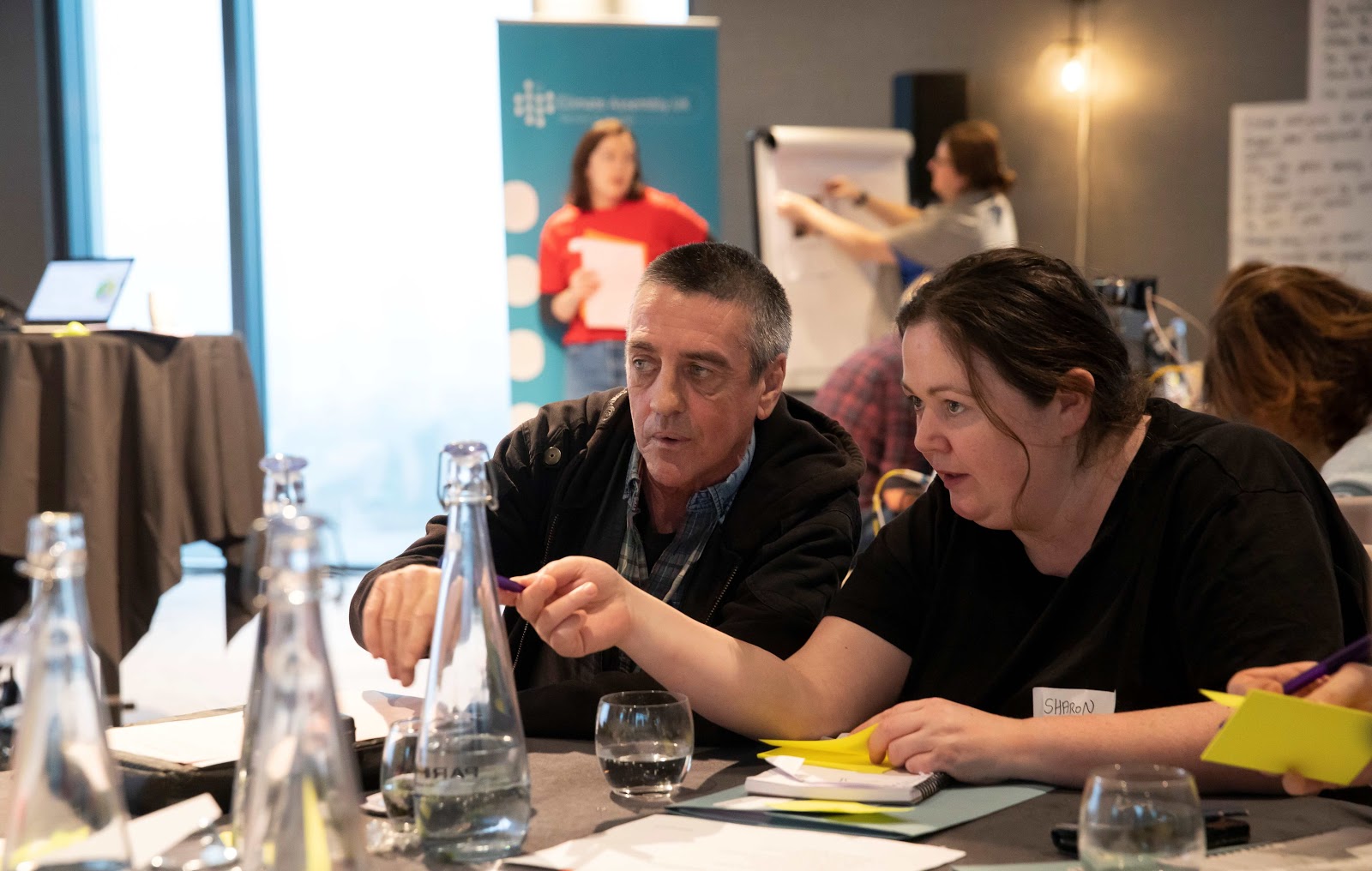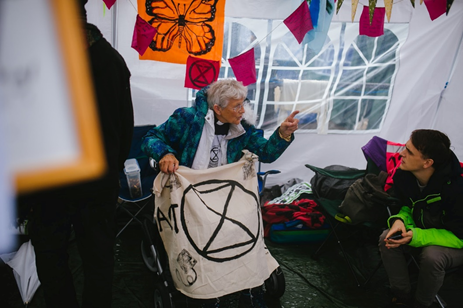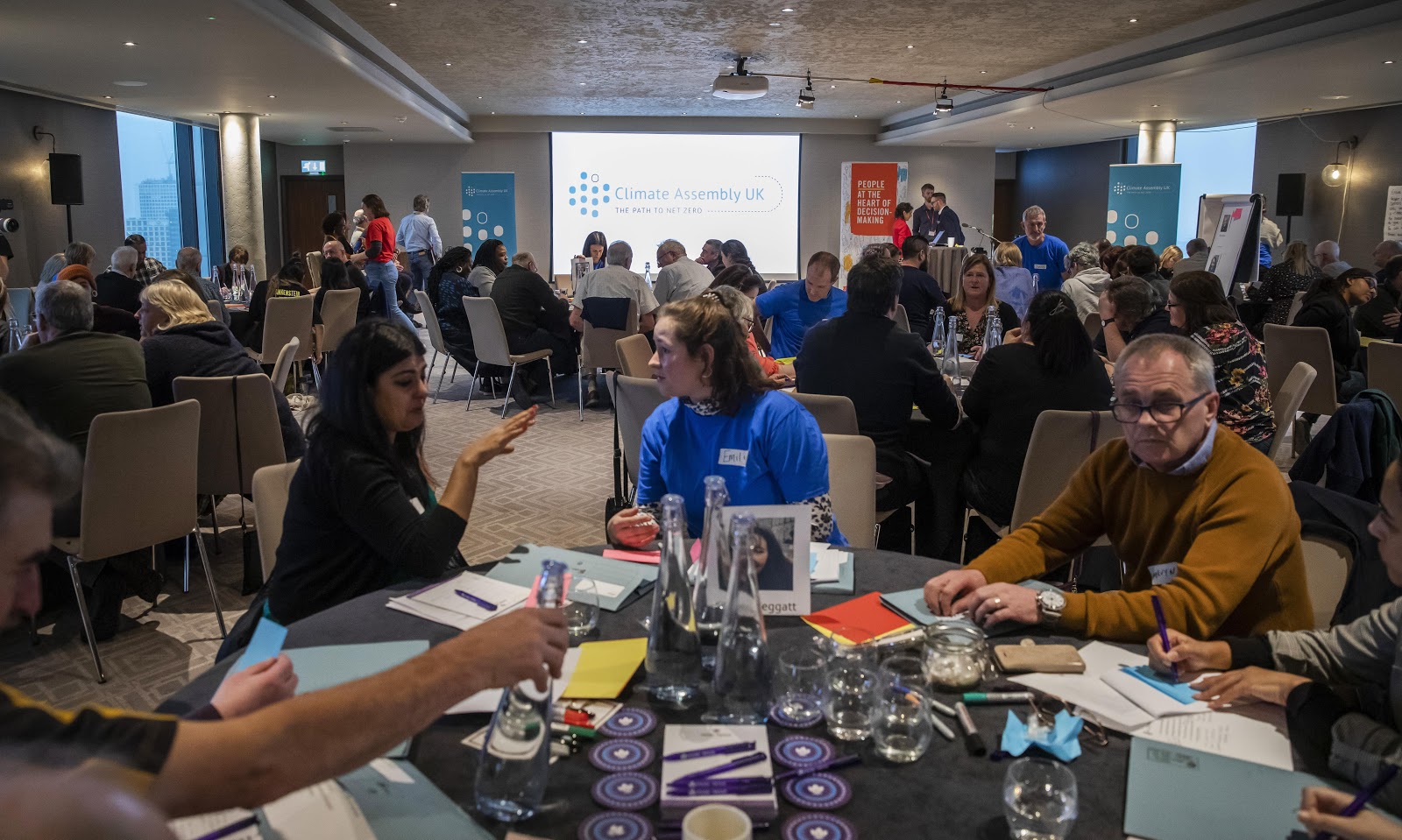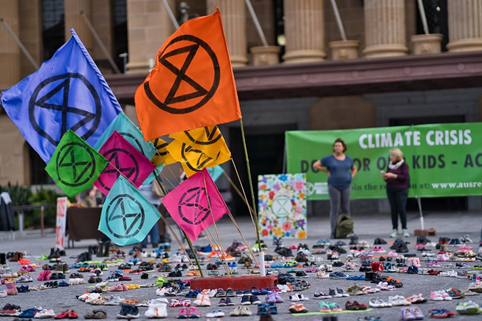
© Fabio De Paola PA Wire
Extinction Rebellion calls for action on the climate and ecological emergency with three demands. The third demand, ‘Go Beyond Politics’, is that governments must form citizens’ assemblies and act on their recommendations.
But what is a citizens’ assembly? And why does Extinction Rebellion care about them? Isn’t XR concerned with blocking roads, handing out vegan cakes and camping in trees?
So many questions.
What are citizens’ assemblies?
Citizens’ assemblies (CAs) aim to give greater political power to citizens. Members of the public who accurately represent those living in the country make up the assembly. For example, there might be a mother of three from the east of the country, a teenaged university student from an ethnic minority group, and a retired police officer from the north.
High-quality information is presented over a series of meetings, covering every angle of an issue – and every side of the argument. The group deliberates and eventually delivers its recommendations to the government. There are several things that could happen next. For example: the government is legally bound to follow the recommendations; the government studies the outcomes to inform policy; the nation votes on the citizens’ assembly’s recommendations.
This process is a form of ‘deliberative democracy’. Most modern democracies limit citizens’ power to voting, but deliberative democracy requires citizens to deliberate, learn, and collaborate on decisions. It’s been gaining attention since the American professor Joseph M. Bessette wrote Deliberative Democracy: The Majority Principle in Republican Government in 1980. The beginnings of the practice of deliberative democracy, however, might be prehistoric. Athens founded the first recorded democracy around 600BCE, which favoured decisions made by a group of randomly selected citizens over appointed representatives.

© Liwordson/Nappy
Why are citizens’ assemblies necessary?
A functioning democracy should enable voters to decide the direction in which their country moves. In theory, if citizens are not happy with this direction, they can vote for change. In practice, however, democratic governments favour solving short-term problems that ensure their popularity. Governments bury difficult, controversial, or long-term issues, such as the climate and ecological crisis.
Setting up a citizens’ assembly addresses this problem: if the pressure of a citizens’ assembly is larger than the pressure of a government’s supporters and funders, action on climate change might be possible. The open discussion of this huge and complicated issue can finally happen in a constructive and fair way.
How does a citizens’ assembly work?
Citizens’ assemblies must follow a carefully designed process. This is incredibly important, because an ineffective CA could create the impression that they’re a waste of time – it would probably be worse than not having one at all.
Each CA differs depending on topic, location, and participants, but this is the rough process:
-
Select a clear topic and question that is suitable for deliberation.
-
Establish a media budget large enough to ensure all people in the country are aware of and engaged with the CA – this puts pressure on the government to follow the CA’s final recommendations.
-
Select coordinators. This should be an independent organisation with experience in organising deliberative processes like citizens' assemblies.
-
Decide on the number of citizens necessary for a fair and representative CA.
-
Choose demographics for a representative CA. For example:
- Age
- Gender
- Occupation
- Ethnicity
- Level of education
- Location
-
Create a media strategy to ensure everyone is aware that it is happening. For example, invite journalists, create a website, create a social media presence, etc.
-
Citizens are chosen using a random selection process, followed by a sorting process to ensure that the sample accurately represents the population as a whole (this is called 'sortition')
-
CA begins:
a. Integration stage
b. Education stage
c. Deliberation stage
d. Recommendations stage
f. Voting stage: Recommendations approved when, for example, 80% agree
-
Publicly announce and publish results:
a. Publicly list details of those in government who are responsible for action
-
Hold regular CA reunions to maintain pressure on government.
Spread the word
Point 2 is essential: everybody should know about the citizens’ assembly and how it has been organised, so that the public trust it. Otherwise, governments may smile, nod, and agree with a CA, then ignore its recommendations. If the nation is aware of the recommendations however, they will be harder for the government to ignore. More pressure equals more action.
A big media budget can fund substantial and ongoing news coverage. A citizens’ assembly should scream and shout about its existence, so everybody’s talking about it.

© Phil Hearing https://unsplash.com/photos/vGMprRUsWzo
Are citizens’ assemblies the same as people’s assemblies?
No. Extinction Rebellion also uses people’s assemblies (PAs), so it is easy to confuse the two terms. Both encourage decision-making through constructive conversation, but a people’s assembly does not have a selection process; anybody can take part. PAs also don't have a learning phase led by experts, nor detailed, critical thinking and learning at the beginning. A PA can also be much shorter than a CA, such as a day or less.
For example, during an Extinction Rebellion protest with a growing police presence, a PA can answer these questions:
- Is it time to leave?
- Is it important to stay and call for more support?
- Is this protest still achieving our aims?
You can answer these questions in a fair, all-inclusive way with a people’s assembly. Every PA participant states their opinion in a small group, followed by deliberation, listening, and conclusions. Each group then submits its conclusions and the assembly reaches a decision.
Extinction Rebellion does not have a leadership hierarchy, so people’s assemblies are fundamental: PAs avoid top-down, undemocratic decision-making.
Read more about people’s assemblies in this guide by Extinction Rebellion UK
Nations without democracy
Authoritarian regimes would not tolerate a citizens’ assembly. Meanwhile, governments of many ‘democratic’ countries may commission a citizens’ assembly that is simply a public consultation, with no real decision-making power. What can we do about this?
Extinction Rebellion’s Participative Democracy hub uses peoples’ assemblies to tackle these problems through a growing global network. The hub organises regular worldwide People’s Assembly Marathons (PAthons), during which a wave of PAs take place across several days. Interested politicians are invited, who may absorb the ideas that they hear from citizens. Another possible outcome is that the government will agree to a citizens’ assembly to stop growing waves of PAs.
Find more information, resources, and training details at XR’s Participative Democracy Working Group: https://partdem-media.wixsite.com/xr-partdemocracy
Are any governments using citizens’ assemblies already?
Good news: there are already examples of government-led citizens’ assemblies.
Poland: Gdańsk Citizens’ Assemblies, 2016 onwards
- In the city of Gdańsk (population 350,000), the mayor must organise an assembly of 56 citizens when a question proposed by residents attracts 5,000 signatures. This began after the city government failed to effectively deal with floods in 2016. Decisions made in these assemblies are binding.
Canada: Citizens' Assembly on Electoral Reform, 2004
- 161 citizens concluded that a new ‘single transferable vote’ system should be implemented in the Canadian province of British Columbia. This conclusion was then the subject of a referendum in 2005. 57.7% of voters were in favour, but because at least 60% was required, no change was made.
Ireland: The Citizens’ Assembly, 2016-2018
- 99 citizens debated several complicated topics, such as abortion rights, and the challenges of an ageing population. Several outcomes included a referendum on abortion rights, as well as a list of 13 recommendations on how Ireland could become a leader in tackling climate change. The Citizens’ Assembly returned in January 2020 to discuss social change in Ireland and the advancement of gender equality.
France: Citizen's Convention on Climate, 2019-2020
- ‘In a spirit of social justice’, 150 citizens attended a series of seven weekend sessions to discuss how France should achieve a 40% reduction in greenhouse gas emissions by 2030. The convention was a response to France’s widespread and prolonged mouvement des gilets jaunes protests. At the time of writing, implementing the convention’s 149 proposals are causing difficulties for President Emmanuel Macron and a bill is due to be presented in December 2020.
A citizens’ constitution
Chile’s Constitution Referendum is a thrilling example of another way to place citizens at the centre of decision-making.
On 25 October 2020, 78.24% of voting Chileans demanded a new constitution for the nation. This referendum followed almost 12 months of continual, massive protests caused by the former constitution, which Augusto Pinochet (Chile’s ex-military dictator) wrote to benefit the rich and powerful.
This vote also declared that a group of nominated and elected citizens will write the new constitution, which the nation will assess and vote on in mid-2022.
Global Assembly 2021
Citizens’ assemblies are clearly growing in significance, because a global version is being planned by globalassembly.org. Conducted online, Global Assembly 2021 will involve 1000 people chosen via a lottery from around the world, taking place in the months before the UN’s Cop26 climate change conference in November 2021. This huge CA won’t have any power over governments but, if it’s managed well, the final recommendations will be difficult to ignore.

© Fabio De Paola PA Wire
CA case study: Climate Assembly UK
During six weekends between January and May 2020, the city of Birmingham in England hosted Climate Assembly UK. Due to COVID-19, the final two weekends were conducted online. The assembly was requested by six ‘Select Committees’ (groups of UK Members of Parliament from various political parties) representing business and energy strategy, the environment, the treasury, housing, local government, science, technology and transport.
This assembly of 110 citizens concentrated on one element of the climate and ecological crisis:
- How can the UK reduce greenhouse gas emissions to net zero by 2050*?
*Extinction Rebellion demands net zero by 2025

Dr Alan Renwick of Constitution Unit at University College London
Climate Assembly UK eyewitness
Dr Alan Renwick was an observer at Climate Assembly UK. Dr Alan works at the Constitution Unit at University College London and is an expert on deliberative democracy.
The weekend started on Friday evening with people gathering. There was a sense of a group coming together and engaging in a collective task, which is important to build up during a citizens’ assembly.
They had various talks from Friday evening and throughout Saturday. They started with material coming from the front of the room. A lot of the time was spent with the members discussing their thoughts, listening to each other, and hearing very different perspectives in the room. Then they relaxed over dinner and did it all again on Sunday.
The feeling in the room was that it was an amazing opportunity to hear from top experts, and that citizens were being listened to by senior decision-makers. One of the first people they heard from was David Attenborough, who said “you have this amazing task and it’s really important that you do it well”.
It is important with a citizens’ assembly that you get the full range of opinions, otherwise policymakers won’t take it seriously. There were people who have a very sceptical view of climate change or don’t think it’s a very high priority, and there were people for whom it was the top priority. But I didn’t notice any clashing; I noticed people listening to each other and respecting each other.
Watch Dr Renwick talking to Climate Assembly UK participants
Climate Assembly UK problems
Climate Assembly UK was not big news: not enough UK citizens knew that it was happening, which is essential if a CA is to create significant change. This viewpoint is echoed by research group Carnegie Europe, which compared 2020’s French and British CAs on climate change.
Its report stated that ‘despite some national press coverage of the UK assembly, the CAUK was never designed to create a genuine national debate, and it didn’t.’ This may be partially due to Climate Assembly UK’s budget, which was 672,139 USD. By comparison, the budget of the Citizen's Convention on Climate in France was 6.34m USD and ‘seven out of ten French people had heard about the convention’s proposals’, according to a Réseau Action Climat France poll.
_The UK government does not have to follow the recommendations of Climate Assembly UK. Instead, the six select committees [‘will use [the recommendations] as a basis for detailed work on implementing the assembly’s recommendations, which will also be debated in the House of Commons’](https://www.climateassembly.uk/about/).
Results
Climate Assembly UK published its recommendations on 10 September 2020. It is not yet clear if this report will lead to significant action in the country, but without mass public pressure, it will be relatively easy for the government to ignore.
After a citizens’ assembly
There is no set pathway for what to do after a CA. Should the decisions made during the assembly be immediately acted upon? Should they be voted on by the public, or perhaps the government? Should they only be advisory?
We asked Dr Renwick for his opinion:
There is disagreement between democratic theorists, but I think it’s important that decisions are made by those who are accountable to voters: politicians.
If you are not giving all voters the chance to hold to account the people who made a decision, it could lead to unhappiness in the wider electorate.
I think setting up a citizens’ assembly helps politicians make difficult decisions. It enables politicians to say: I know this is really tough, but the citizens’ assembly looked at this issue in depth and concluded this is the best thing for the country.
Extinction Rebellion recognises that governments will not independently take bold action on the climate and ecological crisis, because they have already failed to do so for decades. Therefore, it is essential that CAs have a clear route to action, as well as large media budgets, in order to generate support, engagement and trust among the general public. For example, the route to action following France’s Citizens' Convention on Climate is clear:
- Government acts on recommendations
- Parliament votes on recommendations
or
- Nation votes on recommendations in a referendum

© Andrew Mercer (www.baldwhiteguy.co.nz) - Own work, CC BY-SA 4.0, https://commons.wikimedia.org/w/index.php?curid=92110716
This can no longer be the case
Our current political systems are not capable of delivering the necessary solutions to the climate and ecological crisis. While voting is important, this crisis demands more from us than ‘yes’ or ‘no’. How should a nation quickly move away from fossil fuels? Where should wildlife sanctuaries be reintroduced and how? Such large, long-term questions demand deliberation and input from all of us. Well-funded, widely publicised citizens’ assemblies with clear routes to action will answer these questions.
“It is the ambition of every government to remain in power. This ambition has, in the past, limited government’s appetite to take bold and decisive action on policies which might prove too hard or unpopular with the electorate. This can no longer be the case.”
(Climate Assembly UK)
Extinction Rebellion UK published a guide to citizens’ assemblies in 2019, which you can download at xrcitizensassembly.uk. In 2020, XR New York City released Trust the People: The Case for a Citywide Citizens’ Assembly on Climate & Ecological Justice, which you can download at xrebellion.nyc/citizens-assembly.